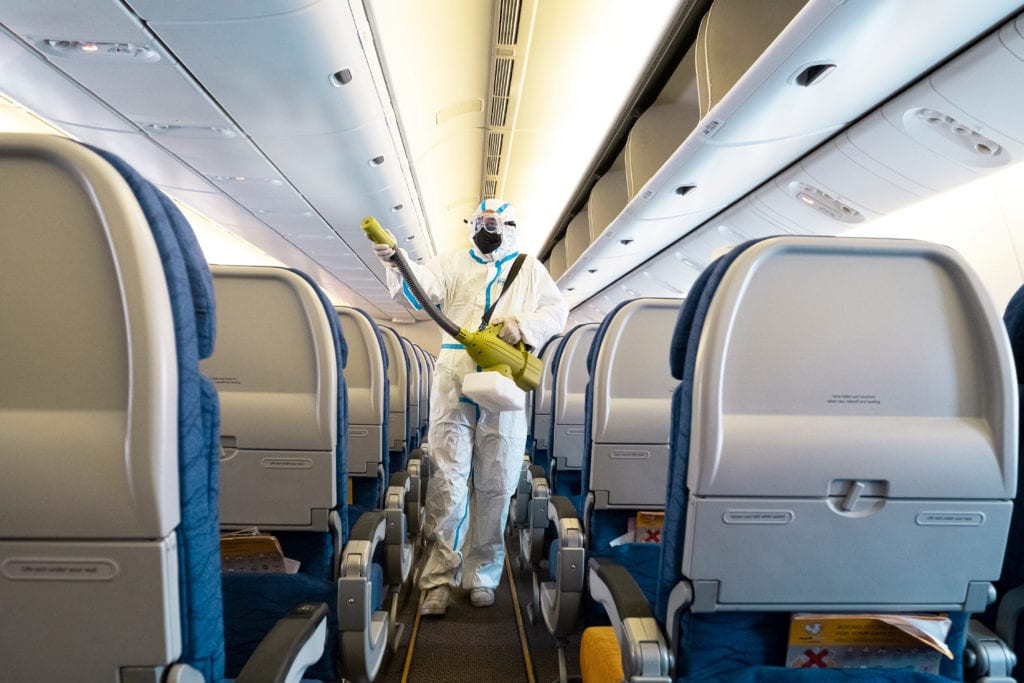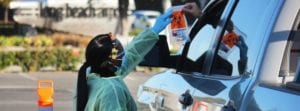By Gary Frazier
Many of us remember the moment a little over a year ago when we realized just how weighty the impact of COVID-19 on our country and the world would be.
For me, that moment came during a July phone call with a healthcare consulting colleague who was in Hawaii. At the time, I was already working to get the idea of mobile COVID testing off the ground to help with efforts to flatten the curve – the genesis for Worksite Labs – but I hadn’t imagined coronavirus could or would evolve into a force to essentially stop the earth’s rotation. Then my friend said he was stuck in place because air travel to the vacation hot spot had been shut down.
“Yeah, great,” I chided. “Stuck in Hawaii. Must be really hard.”
“No, Gary,” he replied, his voice devoid of irony. “You don’t understand. There are bread lines here.” It wasn’t a metaphor.
For a place like Hawaii, whose economy hugely depends on tourism, cutting off air travel was tantamount to cutting off the state’s air supply — not to mention halting the cruise ship business, which brought a stop to visitors via sea. Residents scrambled to figure out how to revive their economy.
Most U.S. localities are not as dependent upon travel as Hawaii, and those that are can be reached by car. But the dire straits the Aloha State endured serve as a microcosm of a plague that faced a $2.6 trillion industry of 15.8 million workers — ranging from airline pilots and cruise ship captains to flight attendants and hotel concierges — left out to dry.
And even as vaccine doses are doled out each day, it’s clear that the travel industry’s dependence upon COVID-19 testing to keep things moving isn’t going away anytime soon.
An industry presses pause
When the virus first reached our shores, the first step was clear to local, state and federal governments: Impede its spread as much as possible. Businesses of all kinds adjusted in rapid, whiplash-inducing fashion: Jobs doable via telework transitioned accordingly; workplaces that needed in-person labor implemented prescribed health safety practices to keep operations abuzz.
But travel can’t be experienced via the web, and not always under social distancing guidelines. Boarding planes or trains means sharing airlocked spaces shoulder-to-shoulder with potentially virus-carrying strangers and reducing traveler risk often means drastically capping passenger volumes. In the incubator-like trappings of a cruise ship, it means ceasing operations altogether.
Unfortunately, limiting or stopping a certain form of travel or closing the doors of a major tourist attraction causes an inevitable, crushing domino effect. Just as cutting off air travel to Hawaii left hotel, airport and restaurant employees fending for themselves, Disneyland’s closure forced everyone from ticket-takers to cast members into sudden unemployment. Even visits to the U.S. National Parks System — destinations that are outdoor and social distance-friendly to boot — dipped by 28% last year, surely jeopardizing countless careers.
Testing is (and will remain) essential
While travel is largely recreational for most Americans, those in the travel workforce consider it essential. Grand efforts have been made to bring other suffering industries back up to speed, but the woes of millions of hospitality workers across the nation have gone largely unsung.
Luckily, I was already in the process of developing a business in which Americans could essentially “jailbreak” the healthcare system, if you will, by paying directly for medicinal services without having to suffer the headache-inducing middleman of insurance. With some inspired reimagination and a whole lot of recycled shipping containers, Worksite Labs was born — seemingly custom-made for travel companies trying to get back up and running. Our partnership with Hawaiian Airlines, for example, has provided 24-hour test results that get travelers the required pre-flight approval they need to travel to the island state once again.
It’s tempting to think that, with the number of fully vaccinated U.S. adults steadily climbing, COVID-19 testing is on the precipice of becoming obsolete. However, the CDC has yet to determine what percentage of the population needs to be inoculated before we achieve herd immunity. Even if such a figure were clear, vaccination has proven a consistently prominent object of concern for many Americans, meaning our progress toward the coveted endpoint could hit a slowdown. Until such a point, the tight testing-related restrictions on travel are unlikely to loosen anytime soon, meaning services like those offered by Worksite Labs will remain indefinitely essential.
Like everyone else, I long for the day when we can return to “normal” as a country and a world at large. But research and headlines have shown that the vaccine might not be the quick-and-easy solution to this international nightmare that we’re hoping it will be. Here are a few facts and figures:
- First, and perhaps most prominently, as of this writing, scientists have yet to develop a vaccine that is safe to use on children. While children are far less likely to become seriously or fatally ill from contracting the coronavirus, that doesn’t mean they can’t spread it — they can, and they certainly have. Add to that the fact that public and private schools across the nation are on their way to once again operating fully in person (if they aren’t already there). Until we find a way to safely inoculate young Americans or somehow reach herd immunity without doing so, the threat of the coronavirus will not be fully eradicated.
- Second, many different American populations — for religious, political or other reasons — are hesitant to get their shot, and some struggled earlier with limited vaccination appointments. While some localities and demographics are visibly optimistic about the vaccine, some Americans tend to be more outwardly skeptical of it). Meanwhile, black and Latinx residents have experienced intermittent bouts of dubiousness of the vaccine as well as overall decreased likelihood to receive it. We can’t underestimate the power of skepticism and racial and/or socioeconomic disparity to slow our approach to herd immunity.
- Finally, even if our country exhibits a lasting, unassailable recovery from COVID-19 (make no mistake — we at Worksite Labs truly hope it does), the world at large remains a very mixed bag when it comes to the effects of the pandemic. India is breaking coronavirus case and death records every day, and countries from Colombia to Germany to Turkey are experiencing frighteningly sharp upticks of their own. Europe as a whole continues to be mired in a months-long vaccine shortage, effectively freezing most travel to what would otherwise be the world’s most tourism-friendly continent by far (though Europe will soon allow vaccinated Americans to visit once again). And while some companies are entertaining the idea of a “vaccine passport” to catalyze travel for vaccinated tourists, the concept has proven largely controversial, having been barred by multiple executive orders at the state level and resoundingly dismissed by the White House.
Even as some states are easing up on restrictions, other localities continue to follow CDC-recommended guidelines as we drive toward vaccination volumes that could make herd immunity likely. For the time being, continuing vigilant testing efforts until the vaccine reaches an effective number of bodies is the only way to get the travel industry moving safely again while the coronavirus remains at large.
Get your business, and the world, moving again
Until we can breathe a collective, oceans-spanning sigh of relief at the end to COVID-19, Worksite Labs will strive to provide travel-friendly, on-site PCR testing at a growing list of U.S. departure points. We recently opened a site in Austin, Texas, and we’ll soon be expanding to San Francisco, Oakland, New York City’s JFK Airport and Atlanta. Plus, we’re hoping to soon cut our 24-hour results turnaround in half to more seamlessly accommodate testing requirements for international flights and other forms of travel.
We want to get back to “normal” just as badly as anyone else. But there is a right way to do it, and for the foreseeable future, that right way includes ongoing COVID-19 testing efforts, both within the travel industry and the world at large.
Gary Frazier is the CEO and founder of Worksite Labs.




